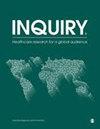长期 COVID 对急性 COVID-19 感染后患者健康相关生活质量的影响:横断面研究
IF 1.7
4区 医学
Q3 HEALTH CARE SCIENCES & SERVICES
Inquiry-The Journal of Health Care Organization Provision and Financing
Pub Date : 2024-04-22
DOI:10.1177/00469580241246461
引用次数: 0
摘要
新型冠状病毒病2019(COVID-19)的长期影响已引起全球关注。本研究旨在调查长期COVID对中国急性COVID-19康复患者健康的影响。我们于2023年2月1日至3月9日进行了横断面问卷调查。我们采用倾向得分匹配法(PSM)来了解患有和未患有长COVID的个体在健康效用值上的差异。采用多元线性回归模型确定了与健康相关生活质量(HRQoL)相关的因素。采用卡方检验比较两组患者在欧洲生活质量五级量表(EQ-5D-5L)各维度上的差异。共有 307 名参与者参与了分析,其中 40.39% 的参与者表现出至少一种持续性症状。长期慢性阻塞性肺气肿的常见症状是疲劳/乏力、咳嗽、记忆力下降、注意力不集中和喉咙有痰。大多数长期慢性阻塞性肺气肿患者表示症状影响轻微。经过倾向得分匹配后,长COVID组的健康效用得分低于非长COVID组(0.94 vs 0.97)。在多变量线性回归分析中,持续性症状和低家庭年收入与较低的健康效用值相关(P < .05)。焦虑/抑郁和疼痛/不适是长期 COVID 患者遇到的主要问题。急性 COVID-19 感染后出现的长期 COVID 症状严重影响了与健康相关的生活质量。因此,有必要实施干预措施,以改善急性 COVID-19 康复后患者的健康状况。本文章由计算机程序翻译,如有差异,请以英文原文为准。
Impact of Long COVID on Health-Related Quality of Life Among Patients After Acute COVID-19 Infection: A Cross-Sectional Study
Concerns have been raised globally regarding the long-term effects of the novel coronavirus disease 2019 (COVID-19). This study aimed to investigate the impact of long COVID on the health of patients recovering from acute COVID-19 in China. We conducted a cross-sectional questionnaire survey from 1 February to 9 March 2023. Propensity score matching (PSM) was used to understand the differences in health utility values between individuals with and without long COVID. Factors associated with health-related quality of life (HRQoL) were determined using a multiple linear regression model. A chi-square test was used to compare differences between the 2 groups for each dimension of the EuroQoL-5 Dimension-5 Level (EQ-5D-5L) scale. In total, 307 participants were included in the analysis, of which 40.39% exhibited at least 1 persistent symptom. The common symptoms of long COVID were fatigue/weakness, coughing, memory decline, poor concentration, and phlegm in the throat. Most patients with long COVID reported mild effects from their symptoms. After propensity score matching, the long-COVID group had lower health utility scores than the non-long-COVID group (0.94 vs 0.97). In the multivariable linear regression analysis, persistent symptoms and low annual household income were associated with lower health utility values ( P < .05). Anxiety/depression and pain/discomfort were the major problems experienced by the participants with long COVID. Long-COVID symptoms following acute COVID-19 infection have a serious impact on health-related quality of life. Therefore, it is necessary to implement interventions to improve patient health after the recovery from acute COVID-19.
求助全文
通过发布文献求助,成功后即可免费获取论文全文。
去求助
来源期刊
CiteScore
2.50
自引率
0.00%
发文量
192
审稿时长
>12 weeks
期刊介绍:
INQUIRY is a peer-reviewed open access journal whose msision is to to improve health by sharing research spanning health care, including public health, health services, and health policy.

 求助内容:
求助内容: 应助结果提醒方式:
应助结果提醒方式:


